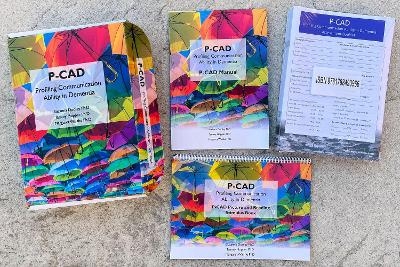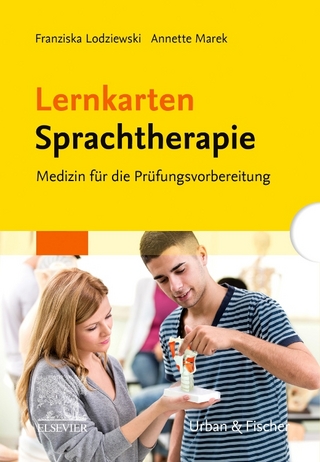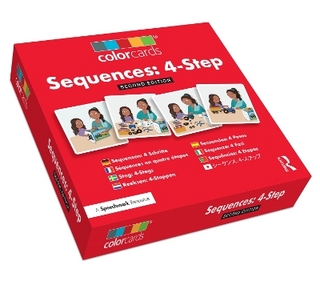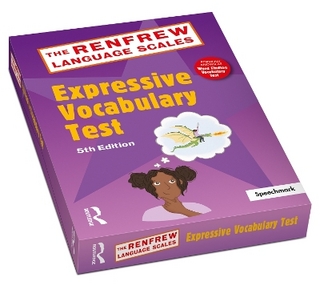
P-CAD Profiling Communication Ability in Dementia
O'Brien Press Ltd
978-1-78849-394-9 (ISBN)
The Profiling Communication Ability in Dementia (P-CAD) tool assesses the cognitive communication abilities of individuals with dementia. It facilitates speech & language therapists (SLTs) in all health care settings to assess and manage communication disorders associated with dementia. It is intended that P-CAD will inform care pathways on communication and be of benefit to the interdisciplinary team in supporting decision-making.
Administration
The P-CAD Pack contains
P-CAD Manual (ISBN 9781788494168)
P-CAD Picture and Reading Stimulus Book (ISBN 9781788494175)
20 x P-CAD Assessment booklets (ISBN 9781788493956)
The assessment booklet has comprehensive instructions that facilitate ease of administration. It takes 30 mins to administer and 5-10 mins to score. A communication partner is involved in the assessment session and their communication skills are also evaluated in the conversation abilities section.
Purpose and Benefits
can be administered by Speech & Language Therapists/Speech Pathologists and cognitive communication specialists
profiles communication abilities and directs individualised advice, support and therapy
evaluates core competencies for everyday communication: auditory comprehension, verbal expression, reading, writing and conversation skills. These competencies then inform the communication profile.
helps determine the most effective communication support strategies
involves a short interview with the communication partner to identify communication strengths and challenges
identifies if the person needs minimum, moderate or maximum communication support
tracks changes in communication over time, measuring the impact of interventions
Validation Outcomes
P-CAD has been validated with people with early, mid and late-stage dementia and their communication partners. It provides clinicians with a tool that can be used with all subtypes and at all stages of dementia. The participants with dementia (n=100) were assessed in a variety of setting and locations including care homes and domiciliary home settings representative of where people with dementia live and interface with SLTs.
The validation study found positive and strong correlations with the Mini Mental State Examination 2 (MMSE-2) (rho=0.812, p<0.001), a measure of cognition, and the Functional Linguistic Communication Inventory (FLCI) (rho=0.828, p<0.001), a cognitive communication assessment. P-CAD scores fall as Global Deterioration Scale (GDS) levels increase, indicating parallels between cognitive decline and reduced communication ability in dementia. There were highly significant correlations between two raters on total P-CAD scoring as well as all eight P-CAD subtests, indicating strong reliability.
The validation paper was published in the International Journal of Language and Communication Disorders.
Suzanna Dooley PhD., CSLS. MIASLT is a speech and language therapist in a community hospital in the Health Service Executive in Dublin, Ireland. She is a clinical specialist in communication and dementia. Her teaching, practice and research focuses on the assessment of cognitive communication disorders in dementia and the development of conversation coaching interventions for people with dementia and their supporters. The P-CAD validation study formed the basis of her PhD research with Dr. Margaret Walshe in 2020 in Trinity College Dublin and was funded by the Health Research Board Ireland. Tammy Hopper, PhD, R-SLP, CCC-SLP is a speech-language pathologist and professor in the Department of Communication Sciences and Disorders, Faculty of Rehabilitation Medicine, at the University of Alberta in Canada. She has worked with individuals with dementia in research and clinical settings for more than two decades. The focus of her research is on interventions to facilitate communication between individuals with dementia and their friends, family and caregivers. She is an author or co-author of more than 75 published manuscripts and book chapters, and she has provided more than 80 presentations on her research. She lives in Edmonton, Alberta, Canada with her husband, two children, three cats, and one dog. Margaret Walshe, M.Sc. PhD is an Associate Professor and speech and language therapist at the University of Dublin, Trinity College Dublin, Ireland. Her specific area of interest is evidence-based practice and rehabilitation in communication and swallowing disorders. She has worked with individuals with dementia focusing on communication and swallowing difficulties as a clinician for a number of years. She is a member of the interprofessional Cochrane Rehabilitation Field and has published over 160 manuscripts and conference abstracts.
| Erscheint lt. Verlag | 16.11.2022 |
|---|---|
| Verlagsort | Dublin |
| Sprache | englisch |
| Maße | 220 x 310 mm |
| Gewicht | 2174 g |
| Themenwelt | Medizin / Pharmazie ► Gesundheitsfachberufe ► Logopädie |
| Medizin / Pharmazie ► Medizinische Fachgebiete ► Geriatrie | |
| ISBN-10 | 1-78849-394-X / 178849394X |
| ISBN-13 | 978-1-78849-394-9 / 9781788493949 |
| Zustand | Neuware |
| Informationen gemäß Produktsicherheitsverordnung (GPSR) | |
| Haben Sie eine Frage zum Produkt? |
aus dem Bereich


